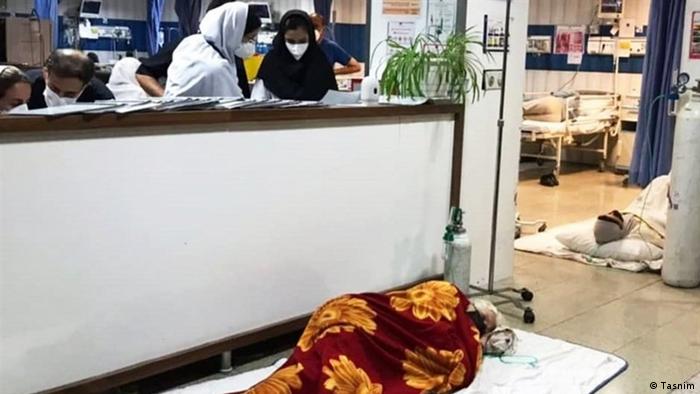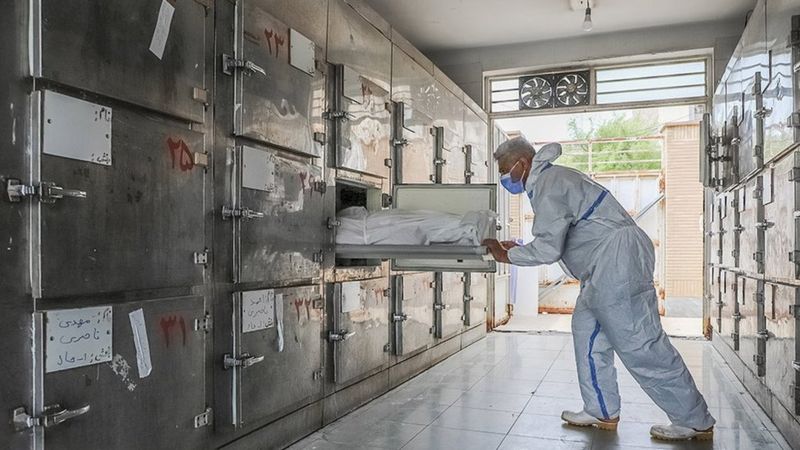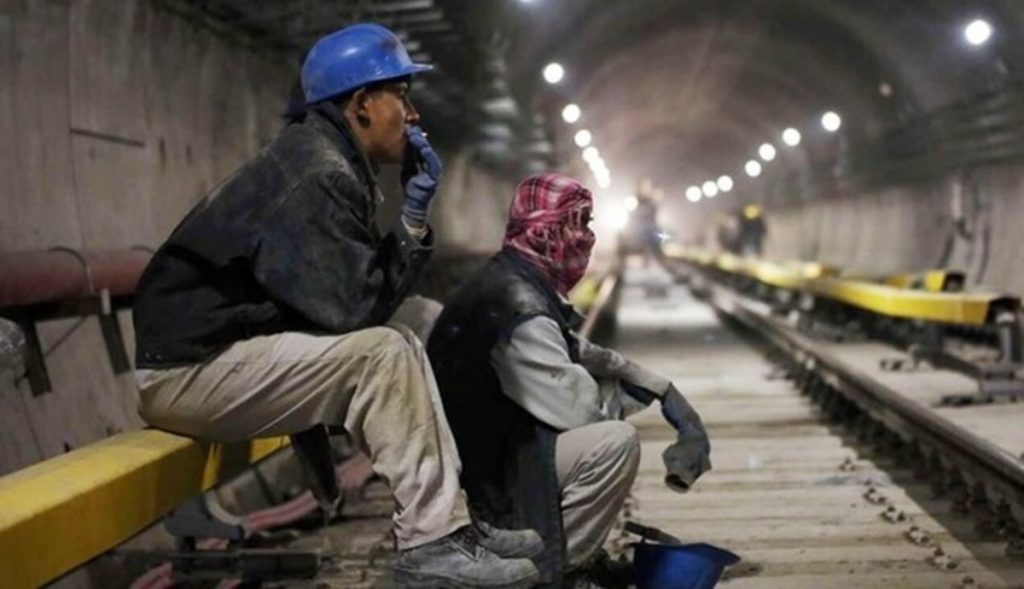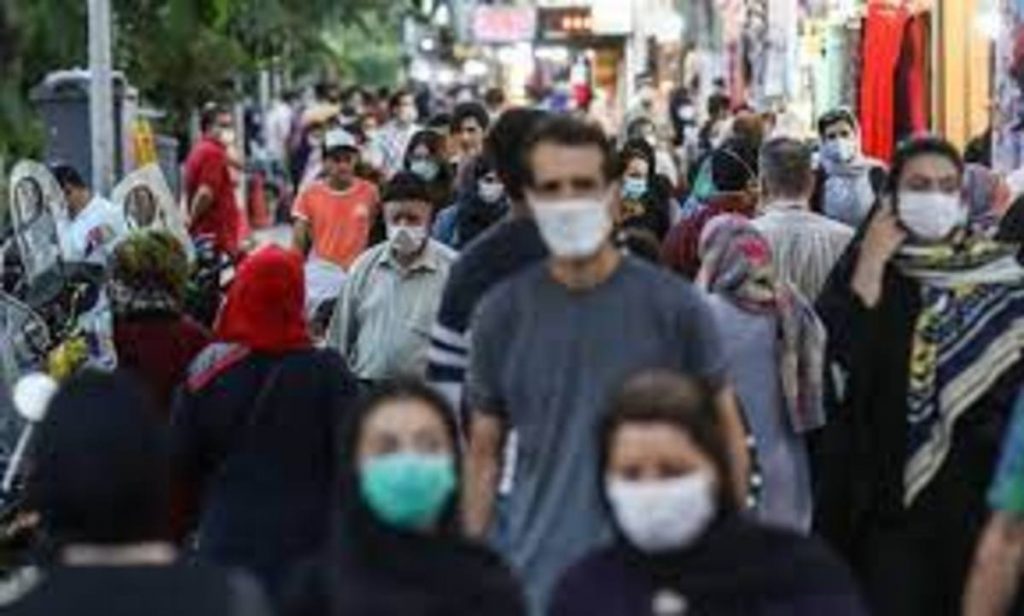
Doubling Down on Wrong Decisions
As Iranian officials announced a nationwide five day closure, an editorial of Aftab Yazd explains why partially shutting down the country to stop the spread of coronavirus is useless, calling for a full lockdown of the country for two weeks as well as giving people financial assistance so they can stay home.
While medical doctors and experts have strongly criticized the management of coronavirus in the country, Iranian authorities double down on making flawed decisions, such as partial closures for the entire country which result in the further spread of COVID-19.
It has been said again and again that to contain the Delta variant, which is more contagious, there must be a 14-day lockdown which must be seriously enforced.
Now the question is: is the partial shutting down of cities useful? Absolutely not. In no country has a five-day closure managed to contain coronavirus and break the chain of transmission. Even though authorities talk of seriously enforcing their decision, we can be sure that this one will not be any different from the previous ones.
More importantly, people were informed beforehand so that they can make the necessary arrangements for going on trips!
It is not that difficult to enforce such decisions. For example, when the coronavirus headquarters decide to shut down the country, isn’t it possible to inform the police to block the roads? Why should it take 24 to 48 hours before the order is enforced?
Why should going on trips by airplanes, trains and buses be free? Passengers are simply passengers, be they in personal vehicles or in public means of transport like airplanes, trains and buses. When it has become certain that coronavirus doesn’t stop through a five-day closure, why don’t they announce a 14-day lockdown?
Even if such decisions are not made due to the particular economic conditions which exist in the country, saving people’s lives must be everyone’s priority. The government must open the treasury to the people and give them financial aid, so that they can stay home for two weeks. Then healthcare workers will have a chance to breathe and cities will stop smelling of death.
People are also entitled to a share in the country’s resources, aren’t they?
Why Has COVID-19 Turned Into Tragedy in Iran, but Is Contained in the Rest of the World?
The editorial of Setareh Sobh asserts that the Iranian authorities are responsible for the deaths of many Iranians due to coronavirus by adopting flawed policies from the beginning.
Last week, coronavirus broke all records in Iran, with 300,000 infections and 3,587 deaths in a week. Hassan Rouhani’s government has been replaced with Raisi’s. But the tragic deaths due to coronavirus still continue. During Rouhani’s government, the record number of deaths was 496, but these days, it has passed 580.
Reviewing the remarks of the Iranian authorities shows that they didn’t take coronavirus seriously in the beginning. Rather, they pretended everything was normal.
When they started to take the virus seriously, the authorities lied about manufacturing domestic vaccines again and again, even alleging that they might export surplus vaccines to other countries. They also promised to import or manufacture 62 million doses of Russian vaccines. But then it became clear that the Russians had broken their promises, delivering only 2 million doses to Iran.
Now the question is: how can the Iranian authorities justify the deaths of thousands of Iranians? If cities like Qom, Mashhad, and other cities in the red zone had been quarantined, people’s lives would have been saved. But instead, incoherent policies were adopted which ended in the deaths of many, many people.
Meanwhile, if from the beginning they had decided to import vaccines and had welcomed foreign aid, the situation would have been quite different and contained. Now it is imperative that the Health Ministry, without playing politics, takes the necessary measures, and asks for medicines, vaccines, and medical equipment from all countries of the world to stop these meaningless deaths.
If instead of making empty promises, the authorities had tried to purchase foreign vaccines and had accepted foreign aid, today the number of deaths due to COVID-19 would not have reached 100,000 and many Iranian families would not be mourning the deaths of their loved ones.
Raisi’s Biggest Problem in Fighting Corruption
The editorial of Aftab underlines that although Raisi has promised that his main plan is to fight corruption, it is so difficult – if not impossible – to keep this promise, because the Iranian government has grown so big that it systematically breeds corruption.
The most important question from President Ebrahim Raisi who has said that his main plan and goal is to fight corruption is: how is he going to fight with this big system which generates corruption?
For 24 years, the body of the government has grown bigger and bigger. Any government that has taken office has added more salaried forces to the administrative system. And now, consequently, most of the government’s revenue is spent on paying these employees’ salaries, most of whom are useless and the system will work more smoothly without them.
According to an economic expert, currently about 3 million people – or even more – are receiving salaries from the government, so whether it is Rouhani’s or Raisi’s government, they must print money to pay these people’s salaries. This means an increase in liquidity which will directly impact the inflation rate.
Fighting a defective system which is becoming worse day by day is not that easy, while making drastic changes to this system requires nothing short of a revolution in the administrative system.
Is Raisi capable of doing such a thing? And if so, where should he start? As Raisi knows, this system breeds thieves. So, how can he fight corruption within it?
The biggest proof that this system breeds thieves and corruption and is defective is that many government employees who are not doing much are still paid.
Before anything else, the defective system which has created so many embezzlers and corrupt individuals must be fixed. So, where and how is Raisi going to fight corruption and injustice?
The Distinction Between Raisi’s Cabinet and Ahmadinejad’s
The editorial of Arman Melli compares Raisi’s nominated cabinet with that of former President Mahmoud Ahmadinejad, highlighting their lack of experience for the positions they are nominated for. It is hoped that by adopting a non-partisan approach, Raisi will prove different from Ahmadinejad.
Finally, President Ebrahim Raisi introduced the nominees for his cabinet. It was expected that right after the election, he would quickly announce his cabinet so the country wouldn’t remain in limbo.
In the proposed cabinet, only three nominees have previous ministerial experience. The rest might have had experience in working in ministries, but they have never been ministers. This is pretty much like Mahmoud Ahmadinejad’s first cabinet.
The First Vice President Mohammad Mokhber can make up for Raisi’s lack of executive experience. Mokhber, who was in charge of the Executive Headquarters of the Imam’s Directive for 14 years, transformed this place from an ordinary entity to a complex involved in all fields.
During his tenure, different holdings became operative, indicating Mokhber’s experience in the fields of electricity, steel, telecommunications, petrochemicals, oil and medicine. In 14 years, he transformed the Executive Headquarters of the Imam’s Directive into a huge economic enterprise which has become the main rival of the private sector. Now the question is whether this organization will now be at the service of the government by giving the private sector a chance to compete in the market.
As for those who are nominated to key economic ministries, if they work together, it increases the chances of the cabinet’s success. Otherwise, they don’t have any track records that would promise their success. As a result of economic disarray, the failing private sector, unbridled inflation, and liquidity growth, there are no investments in different sectors.
The other crucial issue now is the Health Ministry. The question is whether Raisi’s government is going to take Hassan Rouhani’s path in this regard. So far, $1 billion is said to have been spent on manufacturing vaccines, but to no avail. Today, cemeteries are working full force to handle the increasing number of deaths due to coronavirus. The nominated minister, however, doesn’t seem to be much different from that of the former government.
While nominated cabinet members, like that of Ahmadinejad, have no experience, all eyes are on Ebrahim Raisi.
Ahmadinejad, with his maverick attitude, created many problems. There is hope that Raisi will adopt a nonpartisan approach so that in the next three to four months his cabinet might act properly.

The Role of Iran and the Supreme Leader in the Coronavirus Disaster in Iran

The Defenders of Human Rights Center, in a letter to the UN Special Rapporteur on the Right to Health, announced, “Murders due to coronavirus” in Iran, saying the responsibility for this catastrophe is on the Iranian establishment and the Supreme Leader Ali Khamenei.
In the letter to Tlaleng Mofokeng regarding the “regrettable and sad conditions” of the Iranian people, the center pointed to the high number of coronavirus victims in Iran, emphasizing that “every two minutes, one Iranian dies.”
The letter underlines many reasons for the current situation, including “not barring religious ceremonies during the month of Moharram and encouraging people to take part in these gatherings” and more importantly Khamenei’s “unscientific, politicized” remarks and orders which banned the import of vaccines.
The Defenders of Human Rights Center, headed by Nobel Peace Laureate Shirin Ebadi, blamed the Iranian supreme leader for the ineffectiveness and the inability of Iran’s health system in fighting coronavirus which has “resulted in the deaths of many defenseless Iranian people.”
The center has pointed out that Khamenei blamed America for creating COVID-19, and then later at the peak of coronavirus, he banned the import of authorized vaccines to Iran simply because they were manufactured by America and Britain.
In the meantime, as the number of coronavirus victims has greatly increased in Iran, Ali Khamenei is under fire for not allowing the import of vaccines from America and Britain. But Khamenei’s cronies try to blame Hassan Rouhani’s government and foreign countries for the crisis in providing vaccines.
Khamenei’s special doctor, Alireza Marandi, blamed Hassan Rouhani’s government for the delay in importing coronavirus vaccines, confirming that the delay in importing coronavirus vaccines has resulted in an increase in the number of “casualties” due to coronavirus.
As a serious opponent of importing American and British coronavirus vaccines, Marandi underlined that Rouhani’s government didn’t act aggressively enough in importing Chinese coronavirus vaccines which resulted in the scarcity of vaccines in Iran.
Two Renowned Directors Hold Khamenei Responsible for COVID -19 Deaths in Iran

Reports from Iran indicate that hospitals and morgues are full. Iranian authorities say that the situation will get worse in the coming days. A number of Iranian artists have called for prosecuting the health minister, but Jafar Panahi and Mohammad Rasoulof, film directors who are critical of the Iranian establishment, have said that the main culprit is Iranian Supreme Leader Ali Khamenei and he must be held accountable for this situation.
Iranian social media users share pictures of their relatives who have died due to coronavirus. The public sphere is brimming with despair, while holding Shiite mourning ceremonies during the month of Moharram, over which the government has apparently no control, has added to people’s concerns.
On his Instagram page, Jafar Panahi blames Khamenei, saying: “In the beginning of the coronavirus outbreak, he called it fake. Then, when the world was trying to prevent it, he tried to downplay it. And when the leaders of other countries were competing to buy vaccines, he issued an order to ban buying vaccines. Isn’t it time for him to be held accountable for his contradictory remarks? Shouldn’t he be held accountable for risking the lives of 85 million Iranians and the deaths of hundreds of thousands of people?”
Adopting the same stance as Panahi, another film director, Rasoulof, blamed the high number of deaths on Khamenei, saying “[the name of] the perpetrator of this massacre is engraved in the minds of millions of Iranians. The day of justice will come!”
Human rights activist Narges Mohammadi also wrote on her Instagram page that Ali Khamenei is responsible for the deaths of Iranian citizens: every two minutes an Iranian citizen is murdered due to coronavirus which is the outcome of the supreme leader’s remarks and orders. Full and direct responsibility of these murders is on him.
59 Percent of Iranians Not Expecting Improvements in the Future, Shows Poll

According to a poll conducted by the Iranian Student Polling Agency (ISPA), 59 percent of Iranians have lost hope for an improvement in their living conditions. Iranians suffer from “maximal catastrophes” with “minimal support,” while incompetent governments add fuel to crises.
The poll results were published on some domestic media platforms and websites which used it as a basis to review the social and economic conditions in Iran.
Asr Iran website focused on the coronavirus crisis and the unemployment rate saying that there are no exact statistics as to how many people have lost their jobs over the past the one-and-a-half years since the beginning of the COVID-19 pandemic. According to the deputy at the Labor Ministry Isa Mansouri, until last September, almost 6 million people’s jobs were impacted by COVID-19, while 1.5 million lost their jobs due to the coronavirus crisis.
The COVID-19 crisis has become a much bigger issue during the past 10 months as Iranians are facing maximal catastrophes and have minimal support. Many experts see this as an outcome of corruption and flawed policies over the past years. Now Iranians must wrestle with crisis after crisis.
According to the Ministry of Cooperatives, Labor and Social Welfare’s statistics, prices of food items have increased by 71 percent. Furthermore, the minimum wage is far less than the amount needed to cover people’s subsistence basket.
The government shirks its responsibility in dealing with the critical situation in Iran and that has exacerbated the situation. These days, according to Asr Iran, many warnings are issued: warnings about the next coronavirus peak, warnings about the increase in deaths in the coming days, warnings about depression and social and political fallouts over the critical conditions in Iran, warnings about the high prices of essential goods, warnings about the shortage of food items in the coming days. But no one seems to know what must be done about these warnings.
The Poverty Line Reaches 10 million Tomans, Says the Head of the Imam Khomeini Relief Foundation

Estimates show that on average during 2001 to 2019, roughly 33 percent of the country’s population has fallen below the poverty line, while the poverty line has shifted from 950,000 tomans in 2011 to 10 million tomans in 2020, according to the head of the Imam Khomeini Relief Foundation.
Morteza Bakhtiari explained that the results of the studies in the field of poverty show that from 2001 to 2019, household expenses have increased 22 times.
He added that while the population under the absolute poverty line had reached 15 percent from 2013 to 2017, it increased to 30 percent from 2017 to 2019.
Iranian officials and entities have offered different statistics regarding the increase in poverty in Iran.
Last month, the World Bank in its latest report regarding poverty and inequality in Iran, announced that the continuous record of high inflation has pushed a considerable number of the Iranian population towards the poverty line, and annual consumption per capita has decreased which has resulted in a considerable increase in poverty.
In the meantime, rent in certain neighborhoods in Tehran has witnessed a 50 percent to 100 percent increase.
While the statistics of Iran’s Central Bank and the Statistical Center show a 35 percent increase in rents in Tehran and a 39 percent increase in Tehran’s suburbs and other cities, a report by ISNA indicates that rents have at least doubled.
While the new Iranian President Ebrahim Raisi has promised to build 1 million houses per year for the poor and the destitute, studies show an increase in rents from the beginning of the summer and even in the past two weeks since he took office.
